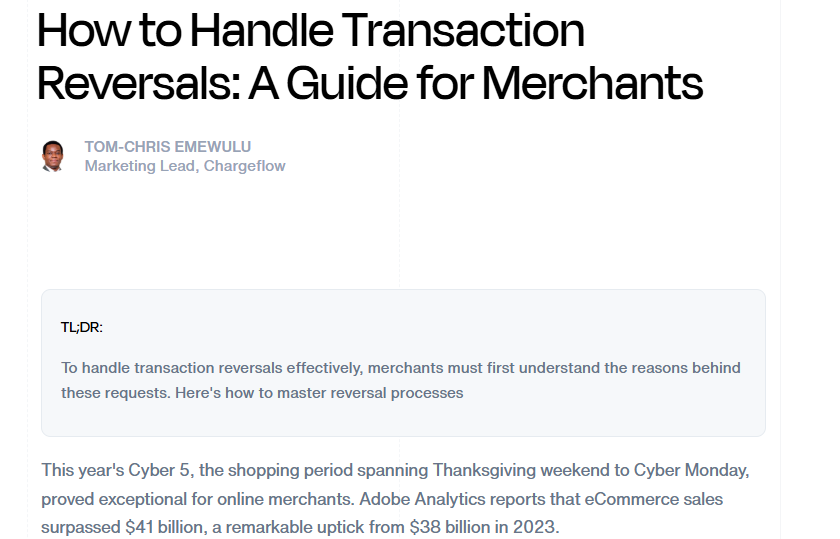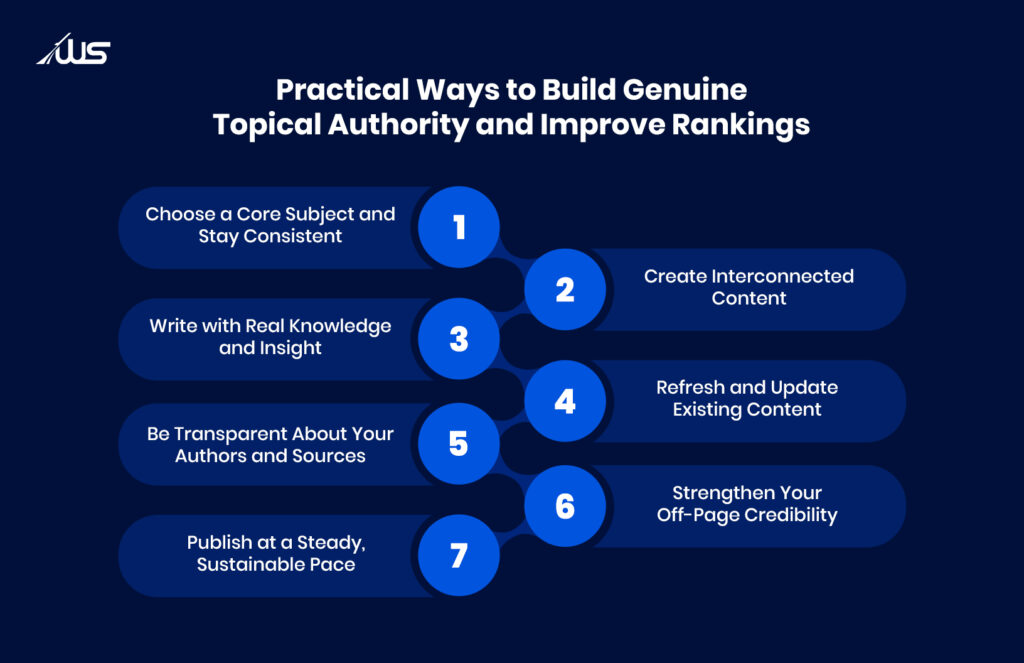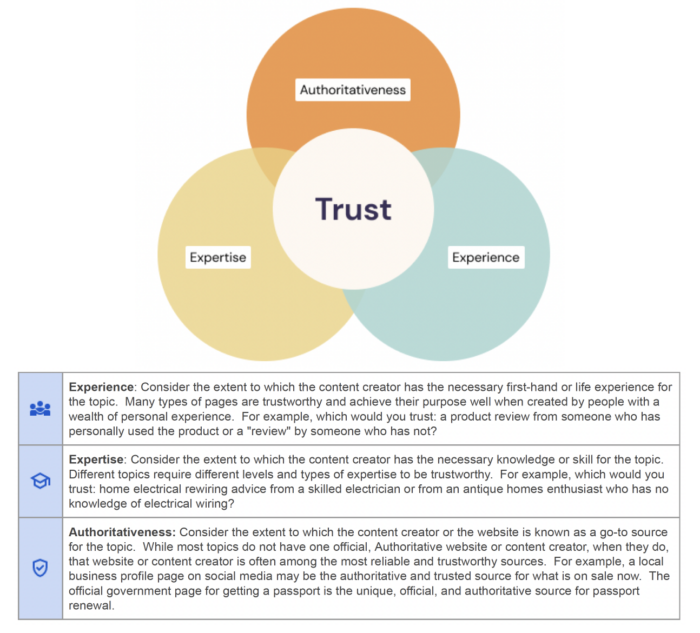
How to Build Topical Authority with E-E-A-T to Boost Rankings
Think of a personal finance website on which every topic is connected to another. Someone visiting the website would read an article on ‘how to improve your credit score’. And from there, they may find links to content on budgeting for beginners, loan comparisons, and long-term savings.
Every page feels like part of a larger plan, written by people who know what they are talking about.
That’s exactly what the popular personal finance platform NerdWallet does. Over the years, the company has built structured, reliable pathways of information. These interlinked pathways make the brand trustworthy to both readers and search engines.
NerdWallet is a great example of how, if you want to improve your search rankings, both E-E-A-T and topical authority come into play.
Let’s see what these SEO concepts are all about.
What Is E-E-A-T, Really?
E-E-A-T stands for Experience, Expertise, Authoritativeness, and Trustworthiness. Experience is about whether you’ve done what you’re writing about. Expertise is your actual skill. Authority is what others think of you. Trustworthiness goes deeper, assessing your transparency, reliability and accuracy.
Introduced in 2014, E-E-A-T is a framework that Google uses to decide if your website’s content is worth showing to searchers.
Why?
Because people searching online want reliable answers, preferably from authorities on the subject.
But, how does Google judge this? It looks at your actual content. Who wrote it? What’s their background? And many more factors.
Why E-E-A-T Matters
People still keep asking, “Does E-E-A-T actually affect SEO rankings?” That’s the wrong question.
While technically, no, it’s not a direct ranking factor, that does not mean you should ignore it. The whole system shapes how Google evaluates your content behind the scenes. Here’s what Google says:
“While E-E-A-T itself isn’t a specific ranking factor, using a mix of factors that can identify content with good E-E-A-T is useful. For example, our systems give even more weight to content that aligns with strong E-E-A-T for topics that could significantly impact the health, financial stability, or safety of people, or the welfare or well-being of society.”
Why does Google raise the bar for these topics?
If your site is dedicated to Your Money Your Life (YMYL) topics like health, finance, safety, etc., Google applies stricter standards. You can’t just write surface-level advice and expect to be taken seriously.
Just look at the finance blog below for guidance on handling transaction reversals. It is certainly not a casual topic. It will be categorized as a YMYL topic by Google.

The problem is, if the information within it is incorrect or misleading, it can cause real harm to individuals. That’s why Google raises the bar. Content on YMYL topics must be accurate, clearly attributed, regularly updated, and preferably reviewed by someone with real expertise.
Even you wouldn’t trust medical advice with no mention of author expertise, right? Well, Google expects the same scrutiny.
Guess what. You are not fooling the algorithm by using keywords alone. Google is looking for content that feels real, useful and rooted in actual experience.
If you consistently adhere to Google E-E-A-T, the search engine will see you as an expert in your field and rank your content higher on search results. Basically, you would be building your topical authority.
Let’s see what topical authority is all about and how vital it is in boosting your search rankings.
What is Topical Authority? How is it Connected to E-E-A-T?
Search engines like Google judge and pass a verdict on the level of expertise and credibility your website has on a given topic (or topics).
To decide whether you have topical authority, it checks if you have covered topics (in your field) exhaustively, exploring various interconnected angles.
It needs to see your website as a trustworthy resource in your particular niche, be it skincare, automotive parts, baby products, ecommerce and so on.
Suppose you come across a website that is covering topics from skincare to gadgets to recipes. Firstly, you would be confused, and secondly, you would not trust the content on that site. Do you agree?
It is that difference which shows Google whether you are a reliable voice in your area.
In fact, topical authority is closely linked to E-E-A-T, because it reflects experience, expertise, and trust built through regular, high-quality coverage of certain subjects. These should be topics that come under your area of expertise, as opposed to random surface-level posts.
We cannot stress enough how important it is for websites to build topical authority if you want to rank high on SERPs (search engine results pages).
Note: It would be unadvisable to try and build topical authority by posting in bulk content on a topic, just for the sake of posting.
You will notice something changing when your website builds a clear sense of expertise around a subject. Google starts recognizing it as a reliable source that genuinely satisfies user search intent and consequently ranks it higher.
8 Best Practices For Building Real Topical Authority to Boost Rankings

While it’s not automatic, building topical authority over time is the surest way for a business to improve its ranking on search engines. This is especially true when it comes to search terms related to your niche, be it fashion, technology, gaming, health and so on.
Here are some simple ways for your business to demonstrate topical authority in your niche.
1. Pick a Focus Area and Stick With It
Would you take fitness advice from a business selling camping gear? No, right? Search engines .
In fact, Google’s biggest ranking drops mostly hit sites that write about random, unrelated topics.
The bottomline is, if your business is fintech, stay in the fintech space. What you can do is create a clear list of the main topics you’ll cover, and build content for beginners, mid-level users, and experts, all within that focus.
If not, your site might look puzzling to both human readers and crawlers. You will notice how your authority grows when your content sticks to one subject and goes deep into it.
2. Build Content That Interlinks
Search engines take into account what users click after reading one of your web pages. That means it’s not just the article itself; they look at how your whole site fits together, structure-wise.
So, if you’ve written a setup guide, you’d need to link it to follow-up articles about next steps or fixes. One way to keep track of these relationships is to map them out in a spreadsheet, it helps you see the missing gaps. Try it.
When people don’t bounce back to Google and instead keep reading material within your site, it’s a positive sign. And for crawlers, this creates a web of meaning they can follow. A strong internal path helps both users and rankings.
3. Write Like You Actually Know the Topic
If you’re writing a tutorial, blog, or guide, people should be able to tell that you have actually done what you’re talking about. That means just writing a list of steps is not enough.
A good way to demonstrate authority would be to show real examples and add relevant screenshots. It would also be a good idea to say what went wrong when you experimented, and how you fixed it.
If some element in your published guide changed recently, did you update it? Did you explain what’s new and why it matters?
It’s important to realize that people will not trust vague advice. And guess what, neither does Google.
4. Update Old Content
Contrary to popular belief, updating old content is not just about changing a date or adding a few new lines. You would need to keep your pages aligned with what’s happening in the real world.
For instance, Google updated how it describes the “Google-Extended” crawler on 24 April 2025. In case you aren’t aware, this crawler determines whether your site’s content can be used for AI model training.
Did you go back and update your AI policy guide after that change? Most people don’t. But that’s exactly the kind of update that Google values when assessing topical authority.
Furthermore, do you track if the posts on your website are still current? You should! A good way is to maintain a spreadsheet with a “last updated” date and review the top pages every 3 months.
When something changes, add a note saying it’s been refreshed, update the screenshots, and adjust the text.
The fact is, in 2025, no one would really rely on an article with screenshots from 2023, right? Keeping your content updated is one of the easiest ways to stay visible.
5. Show Who’s Behind the Content
Have you ever clicked on an article and wondered, “Who wrote this?” That’s a red flag. If you look at any of the authoritative sites, you’ll see that they very clearly display the author’s name and details.
In fact, medical sites do this particularly well, giving author name, image, credentials, and even their registration number.
Could you say the same about your content? Would it pass the test?
It’s vital to create proper author pages with bios, profile photos, and external links like LinkedIn or GitHub. That way, readers and search engines have proof that you are genuine. And in case your CMS hides the author name on category pages, be sure to get that fixed.
It’s simple, people want to know who they are learning from, especially on serious YMYL (“Your Money or Your Life”) topics.
6. Add Off-Page Signals
Recently, many sites experienced ranking drops, but the ones with high-quality backlinks experienced faster recovery. Why?
External signals show that other trusted places value your content as well. Have you contributed to an industry newsletter? Or posted a solution on Stack Overflow? These things help a lot.
Do you keep a list of where your name or brand appears outside your own site? You should. Backlinks are about more than traffic, they’re evidence that your work is recognized and trusted elsewhere.
7. Avoid Publishing Too Much Too Fast
Have you noticed some of your posts say “Discovered, not indexed” in Search Console for weeks? That’s Google telling you that it is not in a hurry to show off your recent posts.
If you are putting out too many low-quality or short posts too fast, the bad news is that might hurt more than help. What you could try is publishing five well-researched articles and then watch how they perform.
If you notice that your impressions rise steadily, go ahead and release the next batch. Do you check visibility after every post? You should. Publishing a few high-quality posts gives your content a real chance to be seen.
8. Align with E-E-A-T
Has your SEO team checked Google’s “Helpful Content” guidelines lately? It says ‘trust’ is the most important factor.
Look at their Quality Rater Guidelines where they have made things very clear:

So, suppose your website posts an article that discusses money or health. Do you interlink it to peer-reviewed research? Do you name the reviewer and mention their credentials?
All of that matters.
Even though these things might not directly boost your rankings, they shape how visitors to your website (and Google) perceive you.
Be honest, could a stranger verify every claim that you have made on your page?
Yes, that’s how high the bar is set. You’ve got to make it easy for people to trust you, not just read your content.
Winding Up
The truth is, SEO today is all about proof. Anyone can publish content online but only a fraction of them actually earn loyalty by building topical authority.
Google’s direction is clear. It only rewards authorities on the subject and can prove it.
Sure, you can spend months optimising titles and keywords, but if your content feels unconnected from real experience, it will consistently sink in rankings.
Your goal shouldn’t be to try and outsmart the algorithms.
You are not likely to succeed. What works is building authority on your specific subject, backing it up with evidence, and keep your content fresh and evolving. That’s what counts in the end.
Frequently Asked Questions
1. How can I tell if my website has strong E-E-A-T?
You can start by asking a few simple questions. Do your articles show who wrote them? Are the writers actually experienced in the topic? Is your information backed by research or expert review? If the answer is yes to most of these, you’re already on the right path.
2. Why does Google care so much about expertise and trust?
Because people depend on Google for serious decisions—like health, finance, or legal advice. If the content is wrong, it can cause real harm. That’s why Google wants to make sure it only promotes information that comes from real, knowledgeable sources.
3. What can I do to build topical authority for my site?
The best way for any business, is to go deep into one subject instead of writing about everything under the sun. Pick a main area, like skincare, finance, or tech, and cover it thoroughly. Write detailed, helpful guides, update them regularly, and connect related articles so readers stay longer on your site.
4. Is posting more content the fastest way to improve rankings?
Not really. Publishing too fast can actually backfire if your posts are short or repetitive. It’s better to focus on quality and depth. Five solid, well-researched posts will do more for your rankings than twenty rushed ones.
5. How can I make my website look more trustworthy to Google and readers?
It’s valuable to show your brand’s human side. You can do this through things like author bios with photos and credentials, or by citing your sources, and keeping old articles up to date. The fact is, when visitors can see who is behind the content and why they should trust you, Google takes notice too.

 Ecommerce Development
Ecommerce Development 













